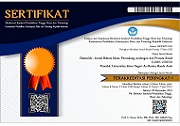MEMBACA TAFSIR HERMENEUTIKA OTORITAS KHALED ABOU EL FADL
Abstract
This paper aims to explain Khaled's thoughts on authority. The emergence of an authoritarian attitude in understanding religious texts is a result of the authority one has in placing a single meaning of a text. This attitude is due to the stagnation of the dialogical relationship between the text, the author and the reader in the realm of Islamic thought. Khaled offers an effort to re-examine the competence of a text, determine the meaning of the text and the attitude of the text reader in expressing the meaning behind the text so that it is in line with the intent of the author of the text. Apart from that, he also offers five requirements that must exist for readers of the text, honesty, sincerity, rationality, thoroughness and self-control.
Keywords
Full Text:
PDFReferences
Hanna Djumhana Bastaman, Integrasi Psikologi dengan Islam: Menuju Psikologi Islami, Cet. II, Yogyakarta: Pustaka Pelajar, 1997.
Jorge J. E. Gracia, A Theory of Textuality: The Logic and Epistemology, (Albany: State University of New York Press, 1995.
Jurgen Habermas, The Philosophical Discourse of Modernity, Cambridge: The MIT Press, 1987.
Khaled Abou El Fadl, Speaking in God’s Name: Islamic Law, Authority, and Women, England: Oneworld Oxford, 2001.
-----------, Atas Nama Tuhan: Dari Fiqh Otoriter ke Fiqih Otoritatif , terj. Cecp Lukman Yasin, Jakarta: Serambi, 2004.
M. Amin Abdullah ‘Pendekatan Hermeneutik dalam Studi Fatwa-Fatwa Keagamaan: Proses Negosiasai Komunitas Pencari Makna Teks, Pengarang dan Pembaca” dalam Kata Pengatar dalam Khaled Abou El Fadhl, Atas Nama Tuhan: Dari Fiqh Otoriter ke Fiqih Otoritatif, terj. Cecp Lukman Yasin, Jakarta: Serambi, 2004.
----------, “Studi Agama Era Post-Positivisme: Implikasinya bagi Dialog Antaragama”, kata pengantar dalam Ruslani, Masyarakat Kitab dan Dialog Antaragama: Studi Atas Pemikiran Mohammaed Arkoun, Yogyakarta: Bentang Budaya, 2000.
----------,, Islamic Studies di Perguruan Tinggi: Pendekatan Integratif-Interkonektif, Cet. III, (Yogyakarta: Pustaka Pelajar, 2012.
Miftahurrohim Syarkun, Konflik Pemikiran Imam Abu Hanifah-Imam Syafi’i dan Dampaknya terhadap Konstelasi Pemikiran Islam, Yogyakarta: Suka Press, 2015.
Mohammed Arkoun, al-Islam al-Akhlaq wa Siyasah, terj. Hashim Shalih, Beirut: Markaz al-Inma’ al-Qaumi, 1990.
----------, Nalar Islami dan Nalar Modern: Berbagai Tantangan dan Jalan Baru, terj. Rahayu S. Hidayat, Jakarta: INIS, 1993.
Nashr Hamid Abu Zaid, Mafhum al-Nashsh: Dirasah fi ‘Ulum al-Qur’an, Beirut: Markaz al-Tsaqafi al’Araby, 1994), hlm. 9; Ilyas Supena, Desain Ilmu-Ilmu Keislaman dalam Pemikiran Hermeneutika Fazlur Rahman, Semarang: Walisongo Press, 2008.
Seyyed Hossein Nasr, Knowledge and the Sacred, Pakistan: suhail Academi Lahore, 1981,
Soerjanto Poespowardojo dan Alexander Seran, Filsafat Ilmu Pengetahuan: Hakikat Ilmu Pengetahuan, Kritik Terhadap Visi Positivisme Logis Serta Implikasinya, Jakarta: Kompas, 2015.
Syamsul Anwar, Interkoneksi: Studi Hadis dan Astronomi, Yogyakarta: Suara Muhammadiyah Press, 2011.
Tarmizi M. Jakfar, Otoritas Sunnah Non Tasyri’iyyah Menurut Yusuf Al-Qaradhawi, Yogyakarta: Ar-Ruz Media, 2011.
Wael B. Hallaq, Ancaman Paradigma Negara-Bangsa: Islam, Politik, dan Problem Moral Modernitas, terj. Akh. Minhaji, Yogyakarta: Suka Press, 2015.
Waryani Fajar Riyanto, Integrasi-Interkoneksi Keimuan: Biografi Intelektual M. Amin Abdullah (1953-…), Person, Knowledge, and Institution, Yogyakarta: SUKA Press, 2013.
DOI: http://dx.doi.org/10.22373/dusturiyah.v9i1.4754
Refbacks
- There are currently no refbacks.
Copyright (c) 2019 Muslim Zainuddin
All papers published in Dusturiyah: Jurnal Hukum Islam, Perundang-undangan dan Pranata Sosial are licensed under a Creative Commons Attribution-ShareAlike 4.0 International License. |
Office address: Fakultas Syariah dan Hukum Universitas Islam Negeri Ar-Raniry. Jl. Ar-Raniry, Kopelma Darussalam, Syiah Kuala, Banda Aceh, Aceh, Indonesia 23111. Email: [email protected]















